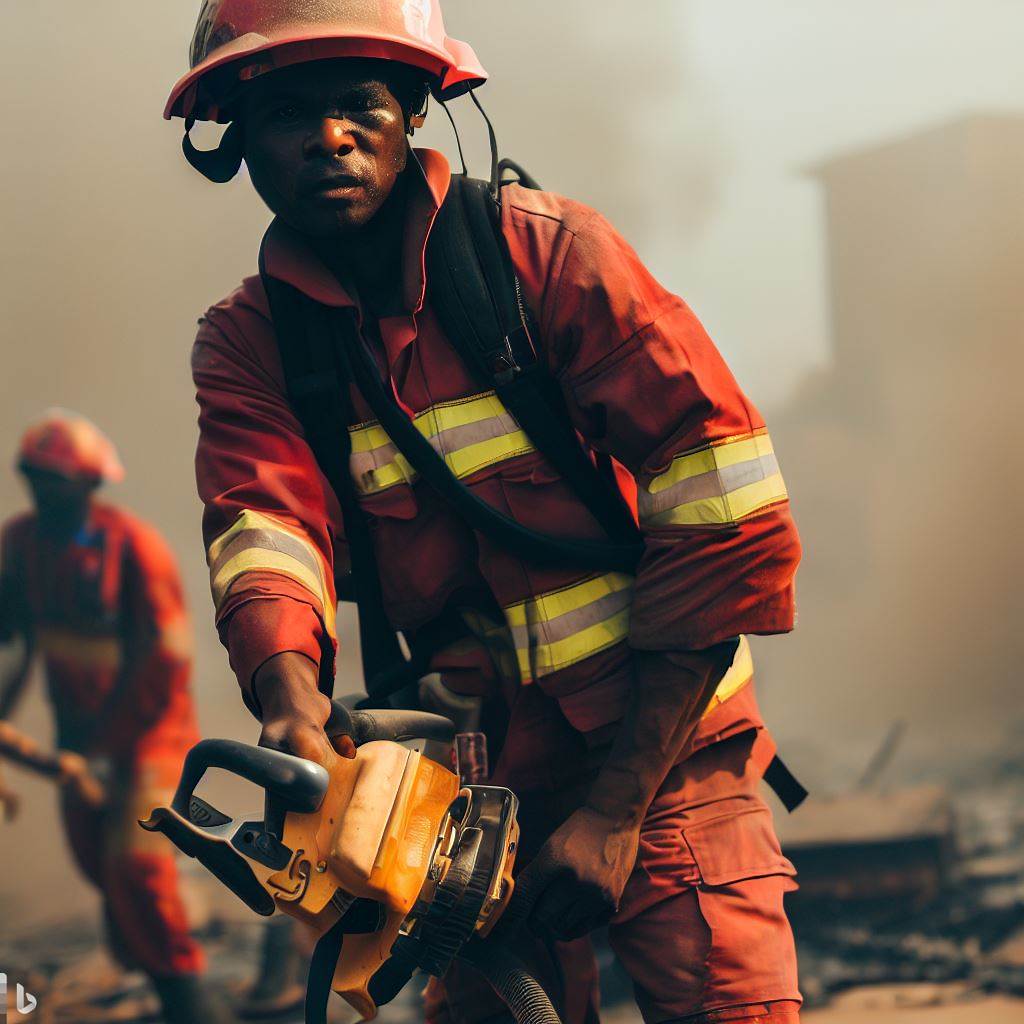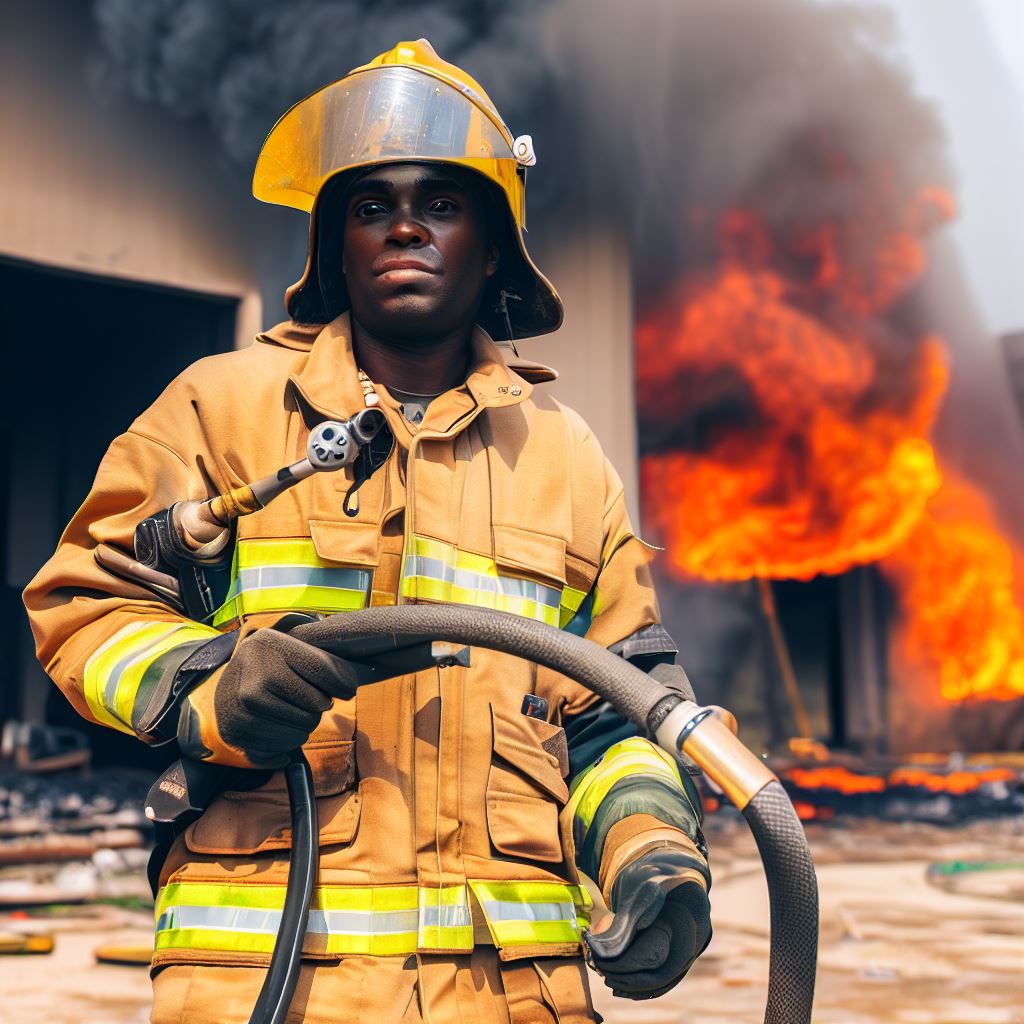Introduction
Today, we will be discussing the importance of health and fitness for fire fighters in Nigeria.
Fire fighters play a crucial role in society by putting their lives at risk to protect others.
In order to perform their duties effectively, it is essential for them to maintain good health and fitness.
Maintaining good health and fitness is crucial for fire fighters as it directly impacts their physical and mental capabilities.
Being in peak physical condition allows fire fighters to carry out physically demanding tasks such as lifting heavy equipment, climbing stairs, and rescuing individuals from dangerous situations.
Moreover, it enhances their endurance, enabling them to endure long hours of work during emergencies.
In this blog post, we will provide valuable tips and strategies for Nigerian fire fighters to improve their health and fitness.
These tips will include exercise routines tailored to their demanding job, nutrition advice to fuel their bodies effectively, and mental health practices to cope with the stress and trauma they may encounter.
By implementing these tips, fire fighters in Nigeria can enhance their overall performance, reduce the risk of injuries, and improve their resilience in high-stress situations.
It is important for fire fighters to prioritize their health and fitness in order to effectively serve and protect their communities.
Stay tuned for further sections in this blog post series, where we will delve deeper into specific exercises, nutrition plans, and mental health techniques for Nigerian fire fighters.
The Importance of Health and Fitness for Fire Fighters
A. The demanding nature of a fire fighter’s job
- Fire fighting is a physically demanding job that requires strength, endurance, and agility.
- Fire fighters often face hazardous conditions such as extreme heat, smoke, and collapsing structures.
- They must carry heavy equipment, climb ladders, and rescue individuals from dangerous situations.
- The job also requires mental toughness to make quick decisions under high-pressure circumstances.
B. How physical fitness impacts job performance and safety
- Physically fit fire fighters are better equipped to handle the strenuous demands of their job.
- Increased strength and endurance allow them to perform tasks more efficiently and for longer durations.
- Being fit reduces the risk of injuries, as strong muscles and bones can withstand physical stress.
- Quick reflexes and agility can save lives by enabling fire fighters to react swiftly and escape dangerous situations.
- Proper fitness levels contribute to better cognitive function, decision-making, and mental well-being.
C. The importance of maintaining good overall health
- Good overall health is vital for fire fighters to perform their duties effectively and safely.
- Regular exercise and a balanced diet help maintain optimal physical and mental health.
- Adequate rest and recovery are crucial to prevent burnout and maintain high levels of performance.
- Fire fighters should actively manage stress and seek support for mental health challenges.
- Regular medical check-ups and screenings can detect and address any potential health issues early on.
In review, health and fitness are of utmost importance for fire fighters to carry out their demanding job effectively and safely.
The physically challenging nature of their work necessitates strength, endurance, and agility.
Maintaining good physical fitness not only enhances job performance and safety but also reduces the risk of injuries.
Additionally, it is crucial for fire fighters to prioritize overall health through exercise, a balanced diet, rest, stress management, and regular medical check-ups.
By prioritizing their well-being, fire fighters can continue to serve their communities with dedication and efficiency.
Read: Heroes Behind the Hoses: Nigeria’s Fire Fighter Profiles
Common Health Risks for Fire Fighters
A. Risks Associated with Exposure to Smoke, Chemicals, and Toxins
- Smoke inhalation can lead to respiratory issues, including asthma and chronic bronchitis.
- Chemical exposure can result in skin irritations, burns, and even long-term organ damage.
- Toxin exposure may lead to various health problems, such as cancer, neurological disorders, and reproductive issues.
- Fire fighters are at risk of encountering hazardous substances, such as asbestos, lead, and hazardous gases.
- Exposure to smoke, chemicals, and toxins can occur during both active firefighting and post-fire cleanup.
- Accidental ingestion or absorption of toxic materials can also pose a significant health risk for fire fighters.
- Proper personal protective equipment (PPE) and decontamination procedures are crucial in minimizing these risks.
- Ongoing training and awareness campaigns are essential to educate fire fighters about the dangers of exposure.
- Regular medical screenings should be conducted to detect any health issues early on and provide timely treatments.
B. Potential Long-Term Health Consequences of these Exposures
- Prolonged exposure to smoke, chemicals, and toxins may lead to the development of chronic respiratory diseases.
- The risk of developing cancer, particularly lung cancer and mesothelioma, is significantly elevated for fire fighters.
- Fire fighters are also more prone to cardiovascular diseases due to the physical demands and stress of the job.
- Exposure to toxins can affect the nervous system, leading to neurological disorders and cognitive impairments.
- Repeated exposure to hazardous substances may result in long-term liver, kidney, and gastrointestinal problems.
- The cumulative effect of these exposures can have a significant impact on the overall quality of life for fire fighters.
- Increased risk of occupational injuries, such as burns, fractures, and musculoskeletal disorders, is another concern.
- The financial burden of long-term health consequences can be overwhelming for individual fire fighters and their families.
- Preventive measures, early detection, and proper support systems are crucial in managing these health consequences.
C. Mental Health Challenges Faced by Fire Fighters
- The demanding nature of the job exposes fire fighters to traumatic events, resulting in psychological distress.
- Post-Traumatic Stress Disorder (PTSD) is a common mental health issue among fire fighters.
- Depression, anxiety, and substance abuse are also prevalent due to the high-stress environment.
- Witnessing injuries, fatalities, and human suffering can significantly impact the mental well-being of fire fighters.
- Stigma surrounding mental health within the fire service often prevents open discussions and seeking help.
- Access to mental health resources, counseling services, and peer support programs is crucial for fire fighters.
- Creating a culture that promotes mental health awareness and encourages seeking help is essential.
- Regular mental health check-ups and debriefing sessions can help alleviate the psychological burden.
- Fire departments should prioritize firefighter mental health and provide necessary resources for support.
In short, fire fighters face various health risks due to exposure to smoke, chemicals, and toxins.
These risks can lead to long-term consequences for both physical and mental well-being.
It is essential to prioritize the health and safety of fire fighters by implementing preventive measures, providing proper training, and offering support systems to address their unique challenges.
Read: Top Fire Fighting Equipment Used in Nigeria Today

Tips for Maintaining Health and Fitness
Maintaining health and fitness as a firefighter is crucial for effectively performing the demanding tasks associated with the job.
In this section, we will discuss some key tips for firefighters in Nigeria to stay physically fit and healthy.
A. Eating a balanced diet
Eating a balanced diet is essential for firefighters to provide them with the necessary nutrients and energy for their physically demanding work.
A balanced diet should include a variety of foods from different food groups to ensure that firefighters obtain all the essential nutrients required for optimal performance and recovery.
1. Providing essential nutrients for energy and recovery
Firefighters should consume a combination of carbohydrates, proteins, and healthy fats to fuel their bodies and aid in muscle repair.
Carbohydrates are a primary source of energy, while proteins are critical for muscle recovery and growth.
Healthy fats help nourish the body and provide long-lasting energy.
2. Avoiding excess sugar, salt, and processed foods
Firefighters should limit their intake of foods high in added sugars, excessive salt, and processed foods.
These types of foods can contribute to inflammation, fatigue, and other health issues.
Instead, they should focus on consuming whole foods, such as fruits, vegetables, lean meats, whole grains, and nuts.
B. Exercise and physical activity
Regular exercise and physical activity are crucial for firefighters to maintain their overall fitness and strength.
Here are some important considerations:
1. The role of cardiovascular exercise and strength training
Cardiovascular exercise, such as running or cycling, helps improve heart and lung function, enhancing endurance.
Strength training exercises, such as weightlifting, promote muscle strength and power, which are vital for firefighting tasks that require lifting, carrying, and pushing heavy objects.
2. Suggest incorporating exercise into daily routines:
Firefighters should make exercise a priority and find ways to incorporate it into their daily routines.
This can include activities like taking the stairs instead of the elevator, doing bodyweight exercises during downtime, or participating in sports or recreational activities on days off.
C. Proper hydration
Proper hydration is essential for firefighters to prevent dehydration and maintain optimal performance.
It is particularly crucial during demanding shifts or when exposed to intense heat.
Here’s why hydration is vital:
1. The importance of drinking enough water
Firefighters should drink enough water throughout the day to stay hydrated.
Dehydration can lead to fatigue, muscle cramps, and impaired cognitive function, which can affect job performance and safety.
2. Tips for staying hydrated during demanding shifts
Firefighters should have access to water throughout their shifts to ensure they can stay hydrated.
They should avoid excessive caffeine or sugary drinks, as these can have diuretic effects.
Drinking water before, during, and after physical exertion is essential to replenish fluids lost through sweat.
In fact, maintaining health and fitness as a firefighter in Nigeria requires a combination of proper nutrition, regular exercise, and adequate hydration.
By following these tips, firefighters can enhance their physical well-being, improve performance, and ensure their safety during demanding shifts.
Read: The History of Fire Fighting in Nigeria: A Brief Look
Mental Health and Stress Management
A. The Impact of Stress on Fire Fighters’ Mental Health
Stress can have significant effects on the mental health of fire fighters, leading to various psychological issues.
It can contribute to anxiety disorders, depression, post-traumatic stress disorder (PTSD), and burnout.
The constant exposure to traumatic events and high-pressure situations puts fire fighters at risk for mental health problems.
Furthermore, the demanding nature of their job can result in sleep disturbances and increased levels of stress hormones.
B. The Importance of Seeking Support and Practicing Self-Care
It is crucial for fire fighters to seek support and practice self-care to maintain their mental well-being.
Having a strong support system, both at work and in personal life, helps reduce the impact of stressors.
Engaging in healthy coping mechanisms, such as regular exercise, hobbies, and spending time with loved ones, promotes self-care.
Seeking professional help, through counseling or therapy, can provide valuable tools for managing stress and maintaining mental health.
C. Relaxation Techniques and Stress Management Tips
To effectively manage stress, fire fighters can utilize various relaxation techniques and stress management strategies.
Deep breathing exercises can help calm the mind and relieve tension in stressful situations.
Practicing mindfulness and meditation can improve focus, promote relaxation, and reduce anxiety.
Engaging in physical activities, such as yoga or tai chi, can have a positive impact on both mental and physical well-being.
Setting realistic goals, prioritizing tasks, and organizing schedules can help reduce feelings of overwhelm and promote better stress management.
Fire fighters face unique challenges that can impact their mental health.
Stress can lead to various psychological issues, but seeking support and practicing self-care are essential for their well-being.
By incorporating relaxation techniques and stress management strategies into their daily routine, fire fighters can effectively manage stress and maintain their mental health.
Read: Fire Fighting Laws and Regulations in Nigeria Explained
Access to Health and Fitness Resources in Nigeria
A. Challenges Fire Fighters Face in Accessing Health and Fitness Facilities
- Limited availability of health and fitness facilities in remote areas.
- Inadequate funding for maintaining and equipping health centers.
- Lack of specialized facilities catering specifically to the health needs of fire fighters.
- Long waiting lists and overcrowding in public health facilities.
- Difficulties in accessing quality fitness and training programs due to limited options.
B. Organizations and Programs Supporting Fire Fighters’ Health Needs in Nigeria
- The Fire Fighters Health Association (FFHA) provides tailored health services and resources.
- The Nigerian Fire Service (NFS) collaborates with health organizations to support fire fighters’ well-being.
- The Fire Fighters Fitness Foundation (FFFF) offers fitness and nutrition programs for fire fighters.
- The Nigerian Red Cross Society provides medical support and emergency services to fire fighters.
- The Fire Fighters Support Network (FFSN) raises awareness and funds to enhance fire fighters’ health.
C. Connecting with Health and Fitness Resources
- Contact local fire service departments to learn about available health and fitness resources.
- Visit the websites or social media pages of organizations mentioned above to access their services.
- Seek recommendations from fellow fire fighters and professionals in the healthcare field.
- Join online forums and communities dedicated to fire fighters’ health and fitness to connect with resources.
- Attend conferences, workshops, and events focused on fire fighters’ well-being to network and gather information.
By understanding the challenges fire fighters face in accessing health and fitness facilities in Nigeria, we can take initiatives to bridge the gaps.
Organizations such as FFHA, NFS, FFFF, Nigerian Red Cross Society, and FFSN play a crucial role in supporting fire fighters’ health needs.
To connect with these resources, reach out to local fire service departments, visit relevant websites, seek recommendations, join online communities, and attend events.
Together, we can ensure that fire fighters have the necessary support for their health and fitness, enabling them to fulfill their critical roles in keeping our communities safe.
Discover More: Nigeria’s Growth: Role of Industrial Psychologists
Conclusion
To recap, we discussed several key points regarding the health and fitness of fire fighters in Nigeria.
It is crucial to emphasize the importance of prioritizing health and fitness for fire fighters. Their physical and mental well-being directly impact their effectiveness on the job.
As readers, we should be motivated to take action and make positive changes in our own lives. Whether we are fire fighters or not, adopting a healthy and active lifestyle is beneficial for everyone.
Let us strive to improve our fitness levels, eat nutritious meals, and prioritize rest and recovery.
By taking care of ourselves, we can contribute to a safer and more efficient firefighting force in Nigeria.
Together, we can make a difference and lead healthier lives.




